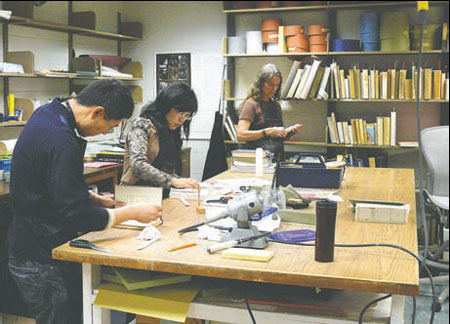Librarians bound to preserve what they value: books
Updated: 2012-12-21 15:06
By Hu Haidan in New York (China Daily)
|
||||||||
|
Deng Liang (left), a librarian at Tsinghua University, and Zhang Lijing, of Peking University, practice the case-binding technique of book preservation during their recent internship at Cornell University's main library in Ithaca, New York. Provided to China Daily |
With digital devices pushing printed books closer to obsolescence, the art of bindery may seem quaint.
For a group of Chinese librarians studying Western techniques of the craft, however, relevance and practicality are never in doubt. Often, paper - subject to decay and easily damaged - is the only medium for some highly specialized academic research, not to mention first editions of literary works. These must be preserved, the professionals stress.
"Print collections are a treasure for the whole world. We need to try our best to protect them," said Zhang Lijing, who works in the special-collections department of Peking University's main library.
Zhang and another librarian, Deng Liang of the science-history collection at Tsinghua University's library, said they were amazed by the binding and preservation techniques they observed and practiced during a recent internship at Cornell University in upstate New York.
Zhang and Deng were the first of four pairs of librarians from Chinese academic libraries to take part in the program at Cornell's main library. The two new colleagues arrived on the Ithaca, New York, campus in early November for six weeks of workshops and classes, after which the next pair will arrive. Other libraries taking part are those of Renmin University and China Agricultural University.
The Chinese librarians spent their time learning Western techniques for repairing the binding on books, exhibition practices that won't damage paper, care and handling of rare and special collections, along with mold prevention and ways to mitigate water damage.
"I am able to show my colleagues how to repair most of the circulating collections," said Zhang.
"Some of our teachers here [at Cornell] have taken courses at universities in the United States or the United Kingdom to learn how to repair books," Deng said. "I hope we can offer similar courses in China."
Major Chinese institutions do an impressive job of protecting domestic books but have limited experience with Western binding, said Barbara Berger Eden, director of the Cornell Library's Preservation and Conservation Department.
She said she hopes her Chinese counterparts will have ideas for establishing comprehensive preservation programs for their collections by the end of the program. To support the librarians even after they return to China, the Cornell library's online preservation tutorial, written in 2000, will be updated with detailed instructions, along with videos and interactive modules for learning.
As the first participants of the internship program, which is funded by an $180,000 grant from the nonprofit Henry Luce Foundation, Zhang and Deng helped specialists at Cornell with some of the English-Chinese translation for the online tutorial.
Eden called the distance-learning module part of a "training the trainers" model whereby interns who have graduated from the six-week program impart the book-preservation skills and knowledge they acquired at Cornell to their colleagues back in China.
"We have Western books that were damaged by the normal reading process," Zhang said of her department in the Peking University library. "Before I came here, we could hardly repair them, so we just kept them away from patrons."
For volumes with historical or other special importance, such as very old editions or those for which only a few copies survive, the cost of preservation - including skilled technicians to do the work - can be prohibitive.
"We still are not able to repair some historical collections," Deng said. "Basically, repairing Western books relies heavily on a librarian's judgment as to the appropriate paper and glue to be used. In some cases, librarians need to mix different kinds of glue together in order to get the best results. We're not experienced enough to do that yet."
haidanhu12@chinadailyusa.com

 Relief reaches isolated village
Relief reaches isolated village
 Rainfall poses new threats to quake-hit region
Rainfall poses new threats to quake-hit region
 Funerals begin for Boston bombing victims
Funerals begin for Boston bombing victims
 Quake takeaway from China's Air Force
Quake takeaway from China's Air Force
 Obama celebrates young inventors at science fair
Obama celebrates young inventors at science fair
 Earth Day marked around the world
Earth Day marked around the world
 Volunteer team helping students find sense of normalcy
Volunteer team helping students find sense of normalcy
 Ethnic groups quick to join rescue efforts
Ethnic groups quick to join rescue efforts
Most Viewed
Editor's Picks

|

|

|

|

|

|
Today's Top News
Health new priority for quake zone
Xi meets US top military officer
Japan's boats driven out of Diaoyu
China mulls online shopping legislation
Bird flu death toll rises to 22
Putin appoints new ambassador to China
Japanese ships blocked from Diaoyu Islands
Inspired by Guan, more Chinese pick up golf
US Weekly

|

|







